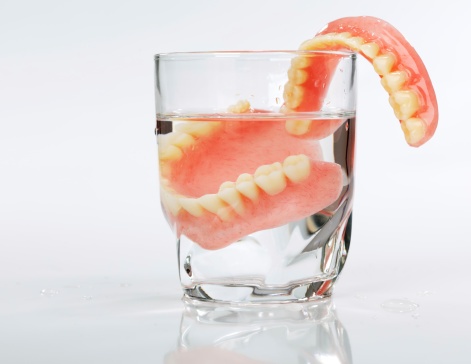By Kate Ranta on Dec 4, 2020 @ 09:00 AM
The American Academy of Implant Dentistry says that 30 million Americans have lost all their teeth in one or both jaws. If this is your case, you might be considering dentures or dental implants. Before deciding, it's important to understand the differences. Let's explore the pros and cons of each option.
Advantages of Dentures
- Dentures cost less than implants, so they are the cheapest option for most people.
- Many people start with dentures because they cost less, allowing them to try them out and see how they feel.
- If you've recently had teeth removed, using dentures first gives your body time to heal before thinking about implants.
- Depending on where the missing teeth are, dentures might be a great choice. Many people find that upper dentures look nice and are comfortable to wear.
- Making dentures doesn't involve surgery.
-
If you lose more teeth later, it's easy to adjust the dentures to fit.
Disadvantages of Dentures
- They do not quite look as natural as dental implants.
-
You need to take them out and clean them often. Many people don't like cleaning the cups and adhesives because it's messy and costs a lot.
- Dentures are not worn overnight.
- Sometimes dentures slip around making it difficult to speak and eat.
- Certain foods cannot be eaten with dentures. Examples include caramel, apples and corn on the cob.
- There’s an increased risk of gum disease if food is trapped by the dentures.
-
Dentures often need to be replaced every 3 to 6 years, unlike dental implants which last over 20 years. They can also break if dropped, needing replacement.
- Partial dentures are known to weaken the adjacent natural teeth that provide support for the dentures.
Advantages of Implants
- They’re easy to care for. Just brush and floss as you do your natural teeth.
- Implants look and feel like natural teeth since the root and tooth is replaced.
- Implants allow you to eat any food including things that are sticky and crunchy.
- Dental implants don’t affect speech.
-
Bones and nearby teeth stay healthy. They don't wear down more, and you probably won't need more dental work later.
- With proper care, dental implants will last for decades.
Disadvantages of Implants
- They can be expensive, with single implants costing up to $4,000 per tooth.
- Implants require surgery to install and generally have a lengthy healing process..
In the end, your dentist can help you decide what's best for your mouth. You might start with dentures and later switch to implants, which last longer. Both options are costly, so ensure you have good dental insurance. Click the image below for a FREE consultation with a Solstice team member today—we'll help you find the right plan!
Want to have Solstice benefits? Call our sales team at 877.760.2247 or email Sales@SolsticeBenefits.com
Already have Solstice benefits? See your plan details by going to https://www.mysmile365.com/ or calling us at 1.877.760.2247.





comments